Unit 8 Culture Shapes Us lesson 45 课件(共28张PPT) 2024-2025学年英语冀教版九年级全册
文档属性
| 名称 | Unit 8 Culture Shapes Us lesson 45 课件(共28张PPT) 2024-2025学年英语冀教版九年级全册 |
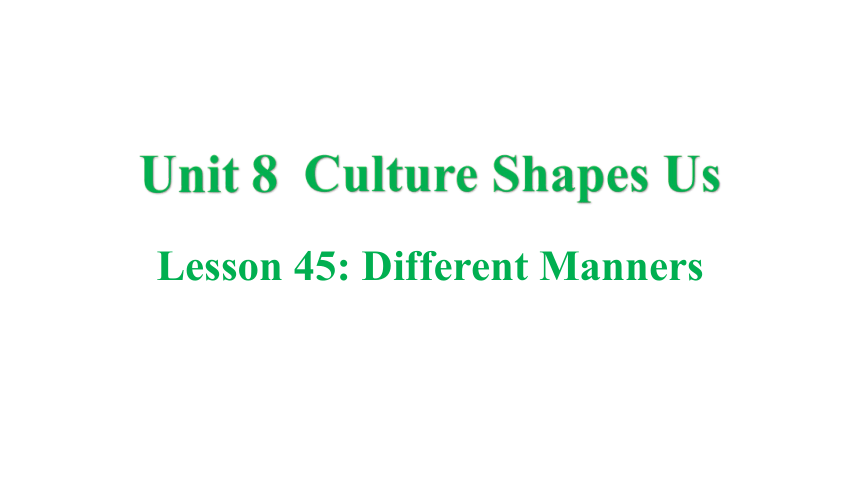
|
|
| 格式 | pptx | ||
| 文件大小 | 960.2KB | ||
| 资源类型 | 教案 | ||
| 版本资源 | 冀教版 | ||
| 科目 | 英语 | ||
| 更新时间 | 2024-11-25 23:08:57 | ||
图片预览

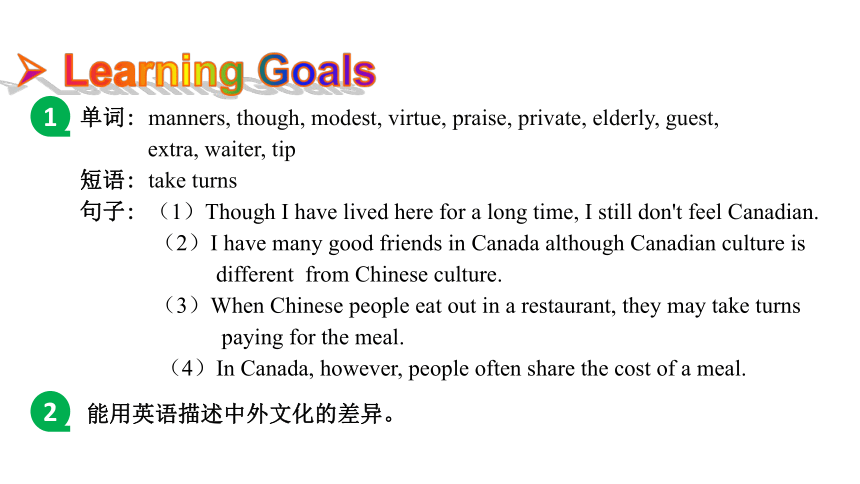

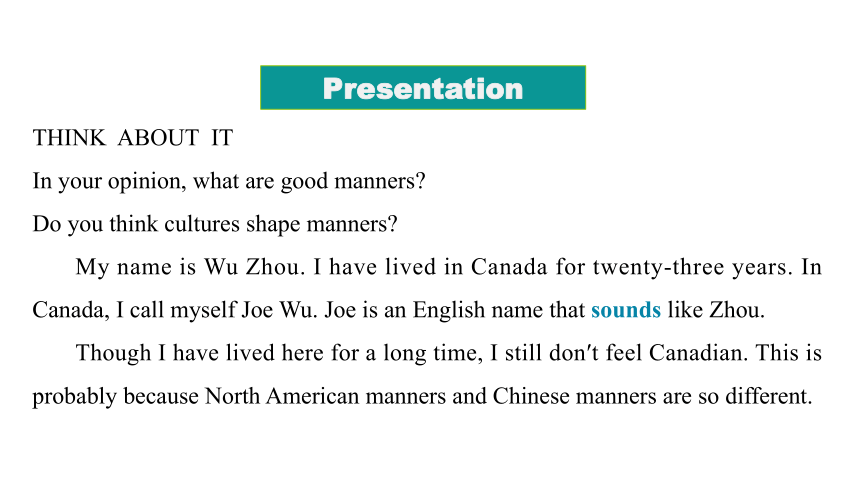
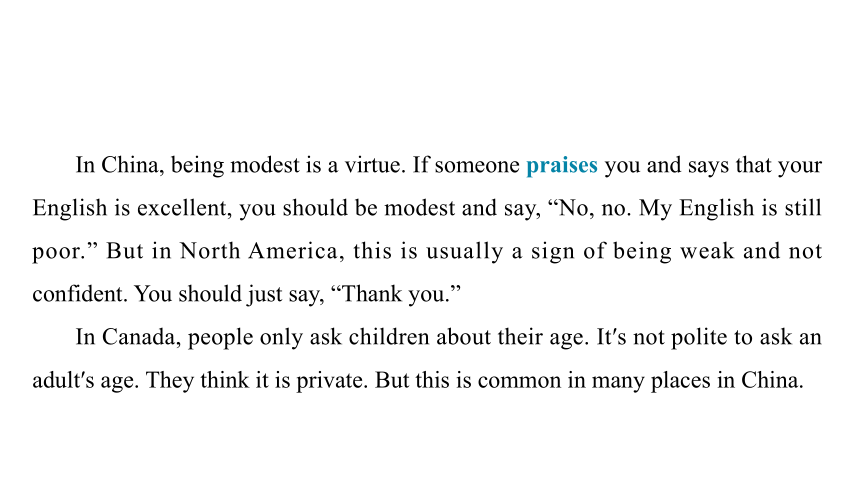


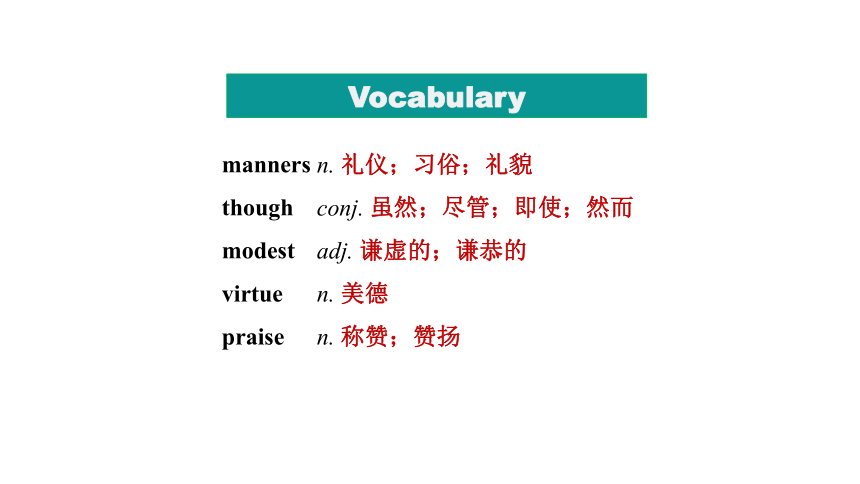
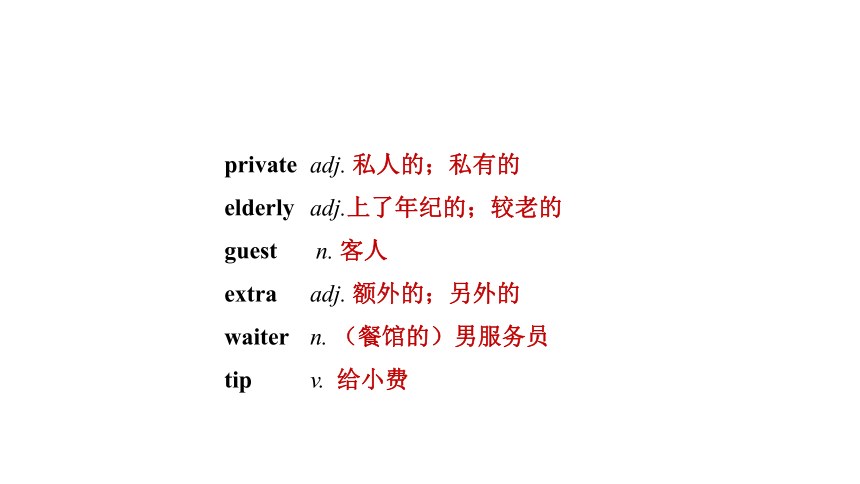
文档简介
(共28张PPT)
Lesson 45: Different Manners
Unit 8 Culture Shapes Us
单词: manners, though, modest, virtue, praise, private, elderly, guest,
extra, waiter, tip
短语: take turns
句子: (1)Though I have lived here for a long time, I still don't feel Canadian.
(2)I have many good friends in Canada although Canadian culture is
different from Chinese culture.
(3)When Chinese people eat out in a restaurant, they may take turns
paying for the meal.
(4)In Canada, however, people often share the cost of a meal.
Learning Goals
1
能用英语描述中外文化的差异。
2
Free Talk
What do you think are good manners
Presentation
THINK ABOUT IT
In your opinion, what are good manners
Do you think cultures shape manners
My name is Wu Zhou. I have lived in Canada for twenty three years. In Canada, I call myself Joe Wu. Joe is an English name that sounds like Zhou.
Though I have lived here for a long time, I still don′t feel Canadian. This is probably because North American manners and Chinese manners are so different.
In China, being modest is a virtue. If someone praises you and says that your English is excellent, you should be modest and say, “No, no. My English is still poor.” But in North America, this is usually a sign of being weak and not confident. You should just say, “Thank you.”
In Canada, people only ask children about their age. It′s not polite to ask an adult′s age. They think it is private. But this is common in many places in China.
In both China and North America, it is polite to offer an elderly person a seat on the bus. In North America, however, an elderly person may feel embarrassed about being offered a seat.
When Chinese people eat out in restaurants, they may take turns paying for the meal. In Canada, however, people often share the cost of a meal.
In China, if your guests have no food on their plates, it's polite to put food on their plates. In Canada, you pass food to guests, but you don′t usually put food on their plates.
In China, people seldom give extra money to waiters, waitresses, taxi drivers or hotel workers. In North America, this is always done. It is called “tipping”.
It′s interesting to experience two different cultures. I think understanding cultural differences really helps us to understand each other, live together and work together.
Vocabulary
manners
though
modest
virtue
praise
n. 礼仪;习俗;礼貌
conj. 虽然;尽管;即使;然而
adj. 谦虚的;谦恭的
n. 美德
n. 称赞;赞扬
private
elderly
guest
extra
waiter
tip
adj. 私人的;私有的
adj.上了年纪的;较老的
n. 客人
adj. 额外的;另外的
n. (餐馆的)男服务员
v. 给小费
take turns 落后
Structures and Expressions
Let’s do it!
1. Read the lesson and match the behaviours with the correct
countries.
asking an adult′s age
putting food on a guest’s plate
giving a tip to waiters and hotel workers
sharing the cost of a meal in a restaurant
Canada
China
2. Match and complete the sentences.
Although people have different cultures and customs,
Brian hasn′t been to China,
He has been at the new school for only a few days,
Though Liu Feng has many friends in America,
but he has already made many friends there.
they have the same feelings.
he still feels lonely.
but he knows a lot about our country.
3. Fill in the blanks with the words or phrases in the box.
pay for praise take turns modest private
1.We should ________ little Debbie for her courage.
2.It′s a long way. We can ____________ driving.
3.They asked him to ________ the damage,but he refused.
4.Don′t talk about other people′s ________ things. It′s not polite.
5.Jack is a ________ man who is admired by many people.
praise
take turns
pay for
private
modest
4. What cultural differences, besides the ones already
discussed, have you noticed between China and
English speaking countries Share your ideas with
your classmates.
(1)sound 作名词时意为“声音 ”。
※Your idea sounds very good. 你的主意听起来很好。
辨析:sound,voise和noise
① sound指自然界里的一切声音。
※Can you hear all the sounds in nature
你能听见自然界的所有声音吗?
1. Joe is an English name that sounds like Zhou.
乔是一个英文名字,听起来像周。
Language points
② voice指从人口中发出的声音,也指一些悦耳的、听起来让人感觉舒服的声音。
※Her voice is loud. 她的声音响亮。
③ noise指噪音,也指听起来让人感觉不舒服的声音。
The noise makes people bored.
噪音令人感到厌烦。
(2)sound 作动词时,可作连系动词,后跟形容词。
※Her voice sounds beautiful. 她的声音听起来很美。
【sound作动词时的搭配】
① sound like 意为“听起来像……”,后跟名词(短语)。
※The man doesn′t sound like an American.
那个人(讲话的口音)听起来不像一个美国人。
②sound 后还可跟as if, 后跟句子, 意为“听起来像…”.
※She sounds as if she were a ten year old girl.
她说话的声音听起来像个十岁的女孩。
【sound作动词时的搭配】
① sound like 意为“听起来像……”,后跟名词(短语)。
※The man doesn′t sound like an American.
那个人(讲话的口音)听起来不像一个美国人。
②sound 后还可跟as if, 后跟句子, 意为“听起来像…”.
※She sounds as if she were a ten year old girl.
她说话的声音听起来像个十岁的女孩。
praise n.& v.称赞;赞扬
(1)praise作动词的用法:
①praise+n./pron.称赞……
※They have been praising you all the time. 他们一直在夸奖你。
② praise sb.for sth. 因某事赞扬某人
※He praised her for her courage. 由于她的勇敢,他赞扬了她。
2. If someone praises you and says that your English is excellent, you
should be modest and say, “No, no. My English is still poor.”
如果有人称赞你,说你的英语很好,你应该谦虚地说:“不,不。
我的英语仍然很差。”
(2) praise作名词的用法:
praise表示对人或事物的“称赞;赞扬”时,通常为不可数名词。
※He won praise for his modesty.
他因自己的谦虚赢得了赞扬。
(1)take turns 轮流
※We take turns cooking dinner. 我们轮流做饭。
take turns常用于take turns to do sth.或take turns (at) doing sth.结构中,
意为“轮流做某事”。
※Take turns to ask questions. 轮流提问题。
3. When Chinese people eat out in restaurants, they may take turns
paying for the meal.
当中国人在餐馆吃饭时,他们可能会轮流支付餐费。
※I’ll pay for the food and you will pay for the drinks.
我付饭菜钱,你付酒水钱。
(2)pay for 为……付钱
experience v. 体验;经历
n. 经验;经历
(1) experience作动词时,可意为“体验;经历”。
※We had never experienced this kind of holiday before and had no idea what to expect. 我们以前从未经历过这种假期,不知道有什么可期待的。
4. It’s interesting to experience two different cultures.
体验两种不同的文化很有趣。
(2) experience 作名词,意为“经验”时,是不可数名词。
※He has a lot of experience in teaching.
他有丰富的教学经验。
experience作名词,意为“经历”时,是可数名词。
※He had a scary experience on the trip to Yunnan.
他在去云南旅行的途中,有一段可怕的经历。
Practice
根据句意及首字母或汉语提示完成句子。
1.T________ he lives alone,he is happy.
2.He can look after the g_________ very well who will visit him.
3.The p________ of his friends made the boy feel very proud.
4.It′s not polite to ask some p______ questions in the western countries.
5.Different cultures ________(影响……的发展) different people.
hough
uest/guests
raise
rivate
shape
Sum up
1. Vocabulary:
manners, though, modest, virtue, praise, private, elderly,
guest, extra, waiter, tip
2. Structures and expressions:
take turns
3. Important sentences:
(1)Though I have lived here for a long time, I still don't feel
Canadian.
(2)I have many good friends in Canada although Canadian
culture is different from Chinese culture.
(3)When Chinese people eat out in a restaurant, they may
take turns paying for the meal.
(4)In Canada, however, people often share the cost of a meal.
Homework
1. Learn the new words and phrases by heart and finish the
exercises of L45 in workbook.
2. Listen to the lesson and read for twenty minutes.
3. Make a project about different manners in one of the
countries you'd like to travel to.
Lesson 45: Different Manners
Unit 8 Culture Shapes Us
单词: manners, though, modest, virtue, praise, private, elderly, guest,
extra, waiter, tip
短语: take turns
句子: (1)Though I have lived here for a long time, I still don't feel Canadian.
(2)I have many good friends in Canada although Canadian culture is
different from Chinese culture.
(3)When Chinese people eat out in a restaurant, they may take turns
paying for the meal.
(4)In Canada, however, people often share the cost of a meal.
Learning Goals
1
能用英语描述中外文化的差异。
2
Free Talk
What do you think are good manners
Presentation
THINK ABOUT IT
In your opinion, what are good manners
Do you think cultures shape manners
My name is Wu Zhou. I have lived in Canada for twenty three years. In Canada, I call myself Joe Wu. Joe is an English name that sounds like Zhou.
Though I have lived here for a long time, I still don′t feel Canadian. This is probably because North American manners and Chinese manners are so different.
In China, being modest is a virtue. If someone praises you and says that your English is excellent, you should be modest and say, “No, no. My English is still poor.” But in North America, this is usually a sign of being weak and not confident. You should just say, “Thank you.”
In Canada, people only ask children about their age. It′s not polite to ask an adult′s age. They think it is private. But this is common in many places in China.
In both China and North America, it is polite to offer an elderly person a seat on the bus. In North America, however, an elderly person may feel embarrassed about being offered a seat.
When Chinese people eat out in restaurants, they may take turns paying for the meal. In Canada, however, people often share the cost of a meal.
In China, if your guests have no food on their plates, it's polite to put food on their plates. In Canada, you pass food to guests, but you don′t usually put food on their plates.
In China, people seldom give extra money to waiters, waitresses, taxi drivers or hotel workers. In North America, this is always done. It is called “tipping”.
It′s interesting to experience two different cultures. I think understanding cultural differences really helps us to understand each other, live together and work together.
Vocabulary
manners
though
modest
virtue
praise
n. 礼仪;习俗;礼貌
conj. 虽然;尽管;即使;然而
adj. 谦虚的;谦恭的
n. 美德
n. 称赞;赞扬
private
elderly
guest
extra
waiter
tip
adj. 私人的;私有的
adj.上了年纪的;较老的
n. 客人
adj. 额外的;另外的
n. (餐馆的)男服务员
v. 给小费
take turns 落后
Structures and Expressions
Let’s do it!
1. Read the lesson and match the behaviours with the correct
countries.
asking an adult′s age
putting food on a guest’s plate
giving a tip to waiters and hotel workers
sharing the cost of a meal in a restaurant
Canada
China
2. Match and complete the sentences.
Although people have different cultures and customs,
Brian hasn′t been to China,
He has been at the new school for only a few days,
Though Liu Feng has many friends in America,
but he has already made many friends there.
they have the same feelings.
he still feels lonely.
but he knows a lot about our country.
3. Fill in the blanks with the words or phrases in the box.
pay for praise take turns modest private
1.We should ________ little Debbie for her courage.
2.It′s a long way. We can ____________ driving.
3.They asked him to ________ the damage,but he refused.
4.Don′t talk about other people′s ________ things. It′s not polite.
5.Jack is a ________ man who is admired by many people.
praise
take turns
pay for
private
modest
4. What cultural differences, besides the ones already
discussed, have you noticed between China and
English speaking countries Share your ideas with
your classmates.
(1)sound 作名词时意为“声音 ”。
※Your idea sounds very good. 你的主意听起来很好。
辨析:sound,voise和noise
① sound指自然界里的一切声音。
※Can you hear all the sounds in nature
你能听见自然界的所有声音吗?
1. Joe is an English name that sounds like Zhou.
乔是一个英文名字,听起来像周。
Language points
② voice指从人口中发出的声音,也指一些悦耳的、听起来让人感觉舒服的声音。
※Her voice is loud. 她的声音响亮。
③ noise指噪音,也指听起来让人感觉不舒服的声音。
The noise makes people bored.
噪音令人感到厌烦。
(2)sound 作动词时,可作连系动词,后跟形容词。
※Her voice sounds beautiful. 她的声音听起来很美。
【sound作动词时的搭配】
① sound like 意为“听起来像……”,后跟名词(短语)。
※The man doesn′t sound like an American.
那个人(讲话的口音)听起来不像一个美国人。
②sound 后还可跟as if, 后跟句子, 意为“听起来像…”.
※She sounds as if she were a ten year old girl.
她说话的声音听起来像个十岁的女孩。
【sound作动词时的搭配】
① sound like 意为“听起来像……”,后跟名词(短语)。
※The man doesn′t sound like an American.
那个人(讲话的口音)听起来不像一个美国人。
②sound 后还可跟as if, 后跟句子, 意为“听起来像…”.
※She sounds as if she were a ten year old girl.
她说话的声音听起来像个十岁的女孩。
praise n.& v.称赞;赞扬
(1)praise作动词的用法:
①praise+n./pron.称赞……
※They have been praising you all the time. 他们一直在夸奖你。
② praise sb.for sth. 因某事赞扬某人
※He praised her for her courage. 由于她的勇敢,他赞扬了她。
2. If someone praises you and says that your English is excellent, you
should be modest and say, “No, no. My English is still poor.”
如果有人称赞你,说你的英语很好,你应该谦虚地说:“不,不。
我的英语仍然很差。”
(2) praise作名词的用法:
praise表示对人或事物的“称赞;赞扬”时,通常为不可数名词。
※He won praise for his modesty.
他因自己的谦虚赢得了赞扬。
(1)take turns 轮流
※We take turns cooking dinner. 我们轮流做饭。
take turns常用于take turns to do sth.或take turns (at) doing sth.结构中,
意为“轮流做某事”。
※Take turns to ask questions. 轮流提问题。
3. When Chinese people eat out in restaurants, they may take turns
paying for the meal.
当中国人在餐馆吃饭时,他们可能会轮流支付餐费。
※I’ll pay for the food and you will pay for the drinks.
我付饭菜钱,你付酒水钱。
(2)pay for 为……付钱
experience v. 体验;经历
n. 经验;经历
(1) experience作动词时,可意为“体验;经历”。
※We had never experienced this kind of holiday before and had no idea what to expect. 我们以前从未经历过这种假期,不知道有什么可期待的。
4. It’s interesting to experience two different cultures.
体验两种不同的文化很有趣。
(2) experience 作名词,意为“经验”时,是不可数名词。
※He has a lot of experience in teaching.
他有丰富的教学经验。
experience作名词,意为“经历”时,是可数名词。
※He had a scary experience on the trip to Yunnan.
他在去云南旅行的途中,有一段可怕的经历。
Practice
根据句意及首字母或汉语提示完成句子。
1.T________ he lives alone,he is happy.
2.He can look after the g_________ very well who will visit him.
3.The p________ of his friends made the boy feel very proud.
4.It′s not polite to ask some p______ questions in the western countries.
5.Different cultures ________(影响……的发展) different people.
hough
uest/guests
raise
rivate
shape
Sum up
1. Vocabulary:
manners, though, modest, virtue, praise, private, elderly,
guest, extra, waiter, tip
2. Structures and expressions:
take turns
3. Important sentences:
(1)Though I have lived here for a long time, I still don't feel
Canadian.
(2)I have many good friends in Canada although Canadian
culture is different from Chinese culture.
(3)When Chinese people eat out in a restaurant, they may
take turns paying for the meal.
(4)In Canada, however, people often share the cost of a meal.
Homework
1. Learn the new words and phrases by heart and finish the
exercises of L45 in workbook.
2. Listen to the lesson and read for twenty minutes.
3. Make a project about different manners in one of the
countries you'd like to travel to.
同课章节目录
- Unit 7 Work for Peace
- Lesson 37 Don't Fight!
- Lesson 38 Making School a Better Place
- Lesson 39 The Dove and the Olive Branch
- Lesson 40 The UN—Power of Words
- Lesson 41 Jenny's Good Advice
- Lesson 42 Peace at Last
- Unit Review
- Unit 8 Culture Shapes Us
- Lesson 43 A Visit to Chinatown
- Lesson 44 Popular Sayings
- Lesson 45 Different Manners
- Lesson 46 Home to Many Cultures
- Lesson 47 Good Manners
- Lesson 48 Supper with the Bradshaws
- Unit Review
- Unit 9 Communication
- Lesson 49 Get Along with Others
- Lesson 50 Tips for Good Communication
- Lesson 51 What Could Be Wrong?
- Lesson 52 The Power of a Smile
- Lesson 53 Working in Groups
- Lesson 54 How Embarrassing!
- Unit Review
- Unit 10 Get Ready for the Future
- Lesson 55 Look into the Future
- Lesson 56 Manage Your Time
- Lesson 57 Best Wishes
- Lesson 58 Ms.Liu's Speech
- Lesson 59 Keep Your Choices Open
- Lesson 60 Get a Good Education
- Unit Review
